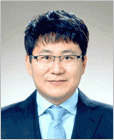


I sincerely welcome you to the department of electronic engineering at Kwangwoon University.
Since the establishment of Kwangwoon Educational Institute in 1934, the department has been considered to be a representative academic program of the university and has performed a pivotal role as a pioneer in developing the electronic engineering in Korea for the past 78 years.
As of the year 2012, the department consists of 18 professors, 630 undergraduate and 90 graduate students. Setting academic goals for producing "World-class engineers who have creativity and capability in practice, the department has been carrying out creative and competitive education and leading-edge research, such as communication and signal processing, microwave and RF, optical communication and optical element, next generation semiconductor, and bio-electronics.
Since 2004, our academic curriculum has been reinforced by adding several major coursework’s associated with ABEEK (Korea Accreditation Board for Engineering Education of Korea) to the program. The department has also been concentrating its academic effort on practice-oriented education for talented electronic engineers through various industry-joint programs with major companies e.g. Samsung Electronics Information Communication Track, LG Electronics, etc.
The faculty members in the department have been actively participating in many private- and government-supported research projects, including the 2nd Project of Brain Korea (BK21), National Research Laboratory, Information Technology Research Center (ITRC), Education Specialization, and the Project of Excellent Research Center designated by the ministry of Education, Science & Technology, building up both research capability and international reputation resulting from excellent achievements. The alumni of the department are now leading the development of electronic technology in most successful enterprises and institute worldwide.
Jae-yeong Park,
Professor
Department Chair
The College of Electronics and Information Engineering